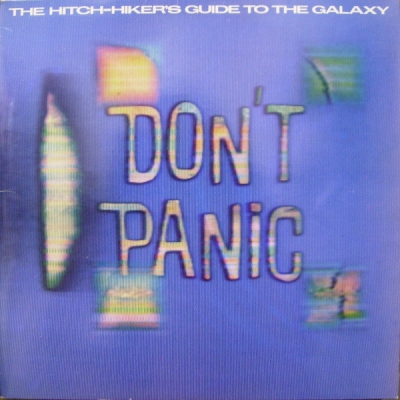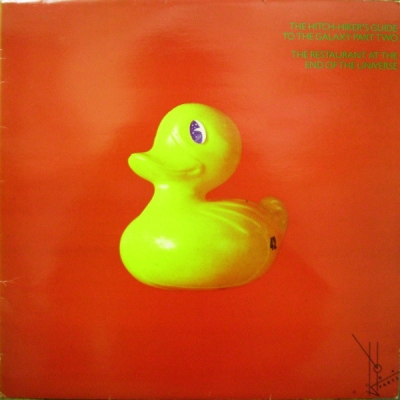The Golden Age of Science Fiction: The Hitchhiker’s Guide to the Galaxy, by Douglas Adams
The British Science Fiction Association (BSFA) Awards have been presented by the British Science Fiction Association since 1970 and were originally nominated for and voted on by the members of the Association. The Media Award was created in 1979, when it was won be the original series of the radio show The Hitchhiker’s Guide to the Galaxy. In its first three years, the award was won by the first and second series of The Hitchhiker’s Guide to the Galaxy radio show as well as the record. The award was presented annually until 1992, when the film Terminator 2: Judgment Day won the final award.
The Hitchhiker’s Guide to the Galaxy was originally a radio show which aired on the BBC from March 8, 1978 to April 12, 1978, with an additional episode (called a fit) airing on December 24, 1978. The show was so popular that a stage show based on the radio show ran from May 1-9, 1979 at the Institute of Contemporary Arts in London. The first four episodes of the radio show were also adapted (with some alterations) for release on a double LP set in 1979 (released in the US and Canada in 1982). The recordings used the original scripts, but cut some sections for timing while adding in alternative lines that were cut from the radio shows (including one that I really enjoy). Most of the original radio cast returned for the record, although Susan Sheridan, who had voiced Trillian, was unavailable since she was recording the voice of Princess Eilonwy for Disney’s animated film The Black Cauldron, and was replaced by Cindy Oswin, who had performed the role in the ICA stage production.
Following the first series of six radio episode of The Hitchhiker’s Guide to the Galaxy, the first portion of the show was re-written and abridged and re-recorded for release on a two disc album. A third disc was eventually released as a solo album entitled The Restaurant at the End of the Universe. By re-recording Douglas Adams’s work, the sound technicians were able to correct some of the more egregiously ear-harming sound effects from the radio show. Unfortunately, some of the throw-away lines that were kept in are not mixed at the right level and disappear behind those sound effects or the incidental music.
With much of the cast reappearing from the radio show (and many of them slated to eventually appear in the television show), it is interesting to listen for differences in delivery. Mark Wing-Davey, Stephen Moore, Peter Jones, Richard Vernon, and Simon Jones seem to be happy with their delivery from the radio series. Geoffrey McGivern occasionally tries alternative readings of his lines as Ford Prefect, which makes listening to the record a little more interesting for those who are familiar with the original radio broadcasts.
Although Adams had a tendency to rewrite his story from version to version, losing the Hagunenons from the original radio show and replacing them with Hotblack Desiato’s band, being one of the major revisions, there are few major alterations between the radio series and the first record album. Perhaps the largest variant introduced into this version, which doesn’t appear in any other version of the story, is the mice deciding to simply make up the ultimate question of life, the universe, and everything and deciding it must be “How many roads must a man walk down?”
The records end with the characters hiding behind the computer that is blown up by the cops who were sent to arrest Zaphod Beeblebrox for the theft of the Heart of Gold. As Zaphod and Ford sing an ancient Betelgeusian death anthem, Arthur sings “Land of Hope and Glory,” and Trillian sings “A Day in the Life,” the computer explodes and Peter Jones announces the end of the story, noting it is misleading as to what happens next, although he does not promise the continuation the would occur with the release of the second album, or, indeed, in the previously aired radio series. The first novel in the series ends at a similar point, although the computer bank doesn’t explode and the cops actually killed accidentally when Marvin made their spaceship commit suicide. Overall, the records are not an improvement over the original radio series, but were a fun, and important, addition to the Hitchhiker’s Saga when the radio series was not generally available to listeners.
The record won out over the films Alien and The China Syndrome as well as the television series Quatermass and Doctor Who, which featured the Key to Time story arc.
 Steven H Silver is a sixteen-time Hugo Award nominee and was the publisher of the Hugo-nominated fanzine Argentus as well as the editor and publisher of ISFiC Press for 8 years. He has also edited books for DAW and NESFA Press. He began publishing short fiction in 2008 and his most recently published story is “Webinar: Web Sites” in The Tangled Web. Steven has chaired the first Midwest Construction, Windycon three times, and the SFWA Nebula Conference 6 times, as well as serving as the Event Coordinator for SFWA. He was programming chair for Chicon 2000 and Vice Chair of Chicon 7.
Steven H Silver is a sixteen-time Hugo Award nominee and was the publisher of the Hugo-nominated fanzine Argentus as well as the editor and publisher of ISFiC Press for 8 years. He has also edited books for DAW and NESFA Press. He began publishing short fiction in 2008 and his most recently published story is “Webinar: Web Sites” in The Tangled Web. Steven has chaired the first Midwest Construction, Windycon three times, and the SFWA Nebula Conference 6 times, as well as serving as the Event Coordinator for SFWA. He was programming chair for Chicon 2000 and Vice Chair of Chicon 7.


LOVE that series.
https://www.blackgate.com/2016/07/04/the-public-life-of-sherlock-holmes-dont-panic/